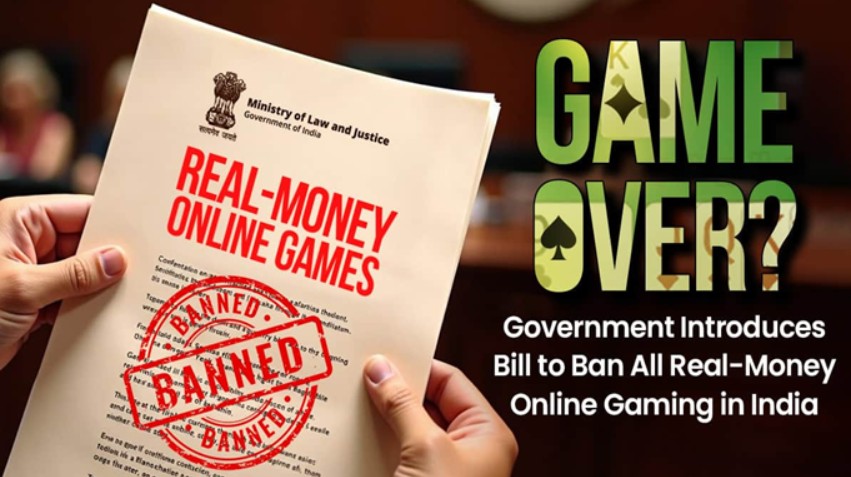
On August 22nd, 2025, the Promotion and Regulation of Online Gaming Act, 2025 was passed in Parliament after the Bill cleared both Houses and got the assent of the President of India. India’s decision to ban real-money online gaming is a historic move aimed at stopping widespread addiction, social harm, and massive financial losses. Official data reveals that 45 crore people lose an estimated ₹20,000 crore every year to these risky digital platforms. This staggering figure illustrates why the government prioritized public welfare over potential revenue loss. As someone who has observed this evolving saga, I see the ban as a necessary stopgap to protect vulnerable citizens from rapidly escalating harm. Hence, this blog explores the ban’s implications across India, focusing on the social impact, industry effects, and the path toward responsible gaming.
The rapid growth of these games, amplified by smartphones and easy online transactions, exposed millions—both urban and rural—to the dangers of compulsive betting. Therefore, intervention was critical to curb addiction that was spiraling out of control. The ban’s significance lies not just in halting harmful practices, but in ushering a sustainable, healthier gaming culture in India, besides safeguarding data privacy. Consequently, we must understand who all have been most affected by the ban, and how the regulation will shape India’s gaming future.
Historical Growth & Risks: The Boom and its Dark Side
India’s online gaming market surged to $3.7 billion (₹31,500 crore) by 2024, projected to reach $9.1 billion (₹78,000 crore) by 2029, growing annually at 19.6%. Real-Money Gaming (RMG)—fantasy sports, rummy, poker, betting apps—comprises 86% of this valuation, with millions of participants nationwide getting hooked to it on a daily basis. Importantly, aggressive marketing including sponsorship of the Indian cricket team and the Indian Premier League (IPL), and celebrity endorsements entrenched these games into mainstream culture, expanding the user base massively.
However, this economic boom concealed a darker narrative. From farmers in Uttar Pradesh to tech professionals in Hyderabad, addiction did not discriminate by geography or income. Data reveals that young adults and low-middle income groups disproportionately suffered, often using gaming as a misguided hope for easy economic betterment. Tragically, over 130 suicides linked to gaming addiction and debts occurred pan-India from 2019-2025, mostly hitting states like Karnataka and Tamil Nadu hard. Illegal money flows and fraud deepened the crises, demanding urgent legislative action.
Games Impacted by the Ban: A Comprehensive Sweep
The law bans all online games where users make monetary stakes hoping for cash or prizes, making fantasy sports, poker, rummy, online lotteries, and betting apps illegal. Even platforms claiming to offer skill-based contests aren’t exempt where real money is involved. This closure of regulatory loopholes aims to protect consumers regardless of the game’s complexity.
However, e-sports, social games without cash rewards, and educational digital platforms are allowed, encouraging safer alternatives. This distinction nurtures the gaming sector’s positive potential without fostering addiction or financial risk. Personally, I believe such balance is vital as it upholds freedom for skill-building and entertainment, while shielding public welfare.
Magnitude and Cost of Real-Money Online Gaming in India (2025)
| Metric | Data |
|---|---|
| Number of users affected | 45 crore |
| Annual financial losses reported | ₹20,000 crore |
| Proportion of gaming revenue from RMG | 85% |
| Estimated pan-India gaming-related suicides | 130+ cases |
| Jobs endangered by ban | 2 to 3 lakhs |
Source: Times of India, Government of India and Police Reports
The Human and Social Cost: Addiction’s Heavy Toll
The toll of real-money gaming addiction is profound and multifaceted. Numerous low-income and working-class families have experienced financial devastation, pushing many towards poverty. Young adults aged 18-30 form a significant demographic of at-risk users, caught in spirals of compulsive gaming fueled by algorithmic designs intended to maximize wagering. Mental health professionals report increased rates of anxiety and depression linked to such addiction.
Furthermore, widespread reports of suicide, especially in southern states like Karnataka and Tamil Nadu, underline the lethal potential of uncontrolled online betting. These personal tragedies, combined with the erosion of trust following fraud and money laundering revelations, made the ban not only necessary, but urgent. The government’s stated rationale foregrounds citizen welfare alongside national security and economic integrity.
Sponsorship and Celebrity Endorsements: From Glory to Responsibility
Real-money gaming’s integration into Indian cricket and entertainment was marked by lucrative sponsorships during the IPL and national team campaigns, featuring major gaming platforms prominently. Celebrity endorsements lent credibility and appeal to these games. This helped build a booming but precarious industry heavily reliant on fan engagement.
Now, with the ban in place, these sponsorships have ceased, creating financial disruptions in sports league ecosystems. However, this gap also opens avenues for promoting ethical advertising linked to wellness and education. As an observer, it’s refreshing to see space made for responsible partnerships away from risk-laden wagering.
Industry Challenges and Emerging Opportunities
The ban poses risks to an industry worth over $3.7 billion and employing up to 3 lakh people across India. The sudden halt in real-money operations unsettles jobs and revenue streams, with tax collections expected to dip. Many startups and major platforms have paused or shut down cash-based offerings.
Significantly, companies plan shifts towards e-sports, social gaming, and EdTech platforms that focus on non-monetary engagement. Government incentives aim to facilitate this transition, ensuring that innovation and employment continue unhindered. The future points to a gaming ecosystem that balances economic viability with social responsibility.
Economic Exposure and Industry Impact (2025)
| Parameter | Data |
|---|---|
| Total gaming market size | $3.7 billion (₹31,500 crore) |
| Real-money gaming share | 86% of total market |
| Jobs impacted by ban | 2–3 lakh |
| Projected growth pre-ban | $9.1 billion by 2029 |
| Estimated GST revenue loss | ₹20,000 crore |
Source: Times of India, Economic Times
The Road Ahead: Holistic Enforcement and Awareness Initiatives
Sustained enforcement is vital to prevent a resurgence of unregulated and fake online betting platforms, post the ban. Accordingly, the law empowers rapid blocking of illicit sites, freezing of transactions, and harsh punishments, including jail and fines for offenders. Furthermore, banks and payment processors must comply with restrictions on facilitating banned games. These layered measures aim to safeguard consumers and maintain market integrity.
Besides enforcement, widespread awareness programs targeting young people, families, and educators are essential in curbing gaming addiction risks. The government plans to launch digital literacy drives, school curricula integration, and social media campaigns about the dangers of online gambling. Community participation and influencer-driven messaging will augment these efforts, ensuring that a culture of responsible gaming develops nationally. To safeguard stakeholders, programs promoting legal, skill-based gaming alternatives and grievance redressal mechanisms will have to be core initiatives that needs implementation.
Building a Safer, Responsible Gaming Culture
India’s real-money online gaming ban addresses a vast public health emergency with courage and clarity. Combining strict enforcement, education, and industry diversification promises a balanced and inclusive gaming ecosystem. The road ahead calls for united efforts from policymakers, corporations, and citizens alike. Together, they can create a flourishing digital arena where fun doesn’t cost lives or livelihoods. The future of gaming in India must respect society’s wellbeing and foster responsible enjoyment. Together, we can build a responsible, vibrant gaming culture, where fun never comes at the price of financial ruin or mental health. The game is on, but the choice is ours. Play smart. Stay safe. 👍On behalf of ExpressIndia.info, I will keep you updated from time to time, on how the industry is performing following the ban, particularly in terms of its social impact. Express your opinions and feedback on what you feel about it. 🎤
#OnlineGamingBan #RealMoneyGaming #IndiaGamingBill2025 #SafeGamingIndia #BanOnMoneyGames
